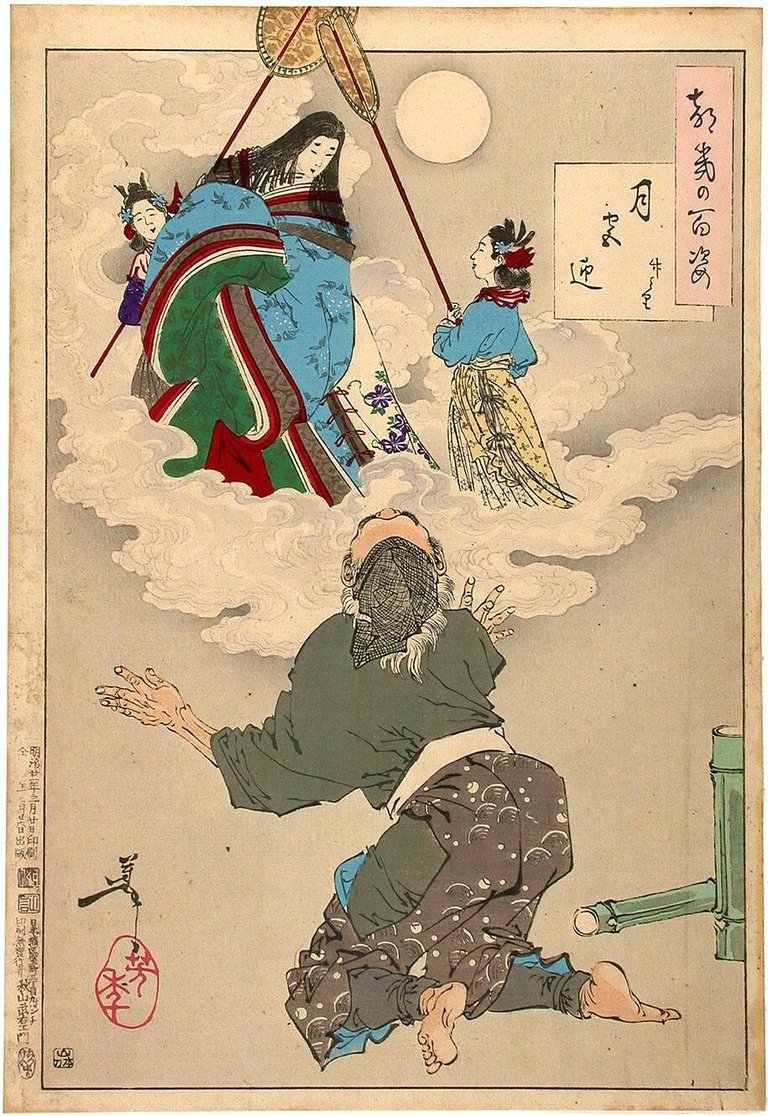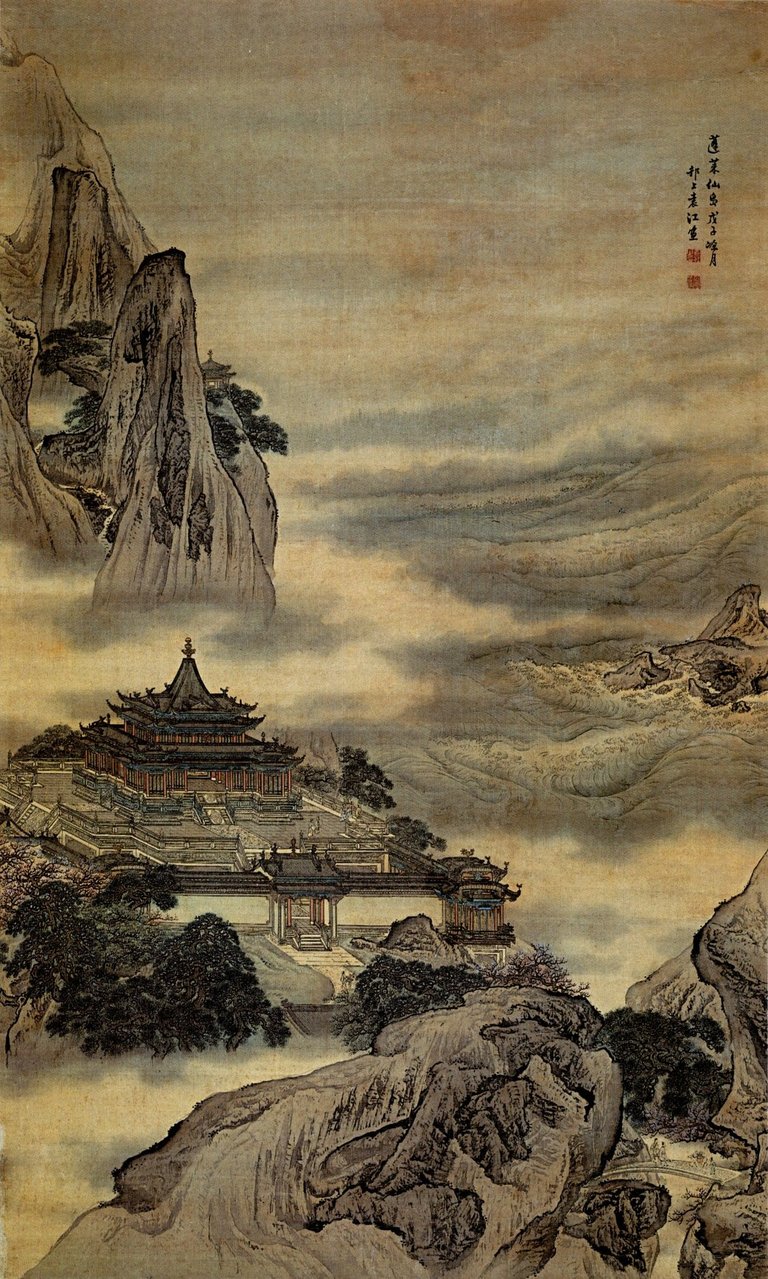There is a curious old Japanese tale called "The Tale of the Bamboo Cutter" (竹取物語, taketori monogatari) or sometimes "The Tale of Princess Kaguya" (かぐや姫の物語, kaguya-hime no monogatari). In this story a bamboo cutter discovers a tiny, radiant baby inside a bamboo stalk and decides to raise her along with his wife. They name her Princess Kaguya.
From that time forward, occasionally when the old man would cut into stalks of bamboo, he would find nuggets of gold and other jewels. He grew rich from all these. Eventually the young woman grew to be an incredibly beautiful woman. So beautiful that she soon attracted suitors from all over Japan to come and win her hand in marriage. Uninterested in marriage, she set impossible tasks for each of them:
- Finding the stone begging bowl of the historic Buddha, Shakyamuni
- Retrieving a branch from the jeweled trees of mythical Mount Horai
- Bringing her a robe of Chinese fire-rat skins
- Managing to get a colored jewel from a dragon's neck
- Securing a cowry shell born from a shallow
All the would-be lovers fail. Then the Emperor of Japan fell for her. She denied him repeatedly until some years later she announced that she was from the moon and that she would be returning there soon. And then she left.

Princess Kaguya Returns to the Moon by Yoshitoshi
She left behind a bit of the elixir of immortality, which the grieving Emperor had destroyed, remarking that he didn't wish to life forever without her.
It's a popular tale. Everyone knows it and it has been adapted for film many times, most recently by Studio Ghibli in 2013.
If you know anything about Eastern religions, the bit about the elixir of immortality might clue you in to the story's strong Taoist influences. Taoism was pretty popular among the Heian nobility and had a lot of influence in early Japanese stories. In Taoist tales, people are forever searching for potions of immortality. It's something of an obsession. The moon itself was considered a place of immortality in some Taoist cults and so escaping to it was to gain immortality. At least one of the impossible tasks the princess gives is also strongly linked to Taoism.
The jeweled trees of Mount Horai. These are described differently in different versions of the story, but they are usually made of silver and gold in some configuration and bear jewels on their branches. Mount Horai (蓬萊山) is better known in China as Mount Penglai, the legendary home of the eight immortals of Chinese myth. The real location of the mountain is unknown, but many real world treasure-hunters have never stopped trying to find it. In the Chinese version of the myth, it's not just trees of silver and gold but it is said that everything is made of silver and gold. There is also no winter, no suffering, and fruit is grown there that will heal any illness, even bring people back from the dead. Oh yeah: immortality too. In the West, or at least in America, the closest image we might have to this paradise on earth is the idea of Shangri-La.
The Japanese myths of the mountain are not quite as amazing, but they do still paint a pretty nice place to visit. Over the years as Taoism faded in Japan, the grandness of Mount Horai also faded, but even by the time Japan opened to the West, it still held the image of a legendary place.

Penglai Island by Yuan Jiang

I'm thinking of all this because a haiku I came across the other day referenced the legendary Mount Horai. It also mimicked the structure of an old Tang Chinese poem that refers to Mount Penglai. This kind of double-reference is fairly common. Back in the day, knowing all the old Chinese poems and the myths of both countries was just as common in Japan as knowing the myths of ancient Rome and Greece was in the West. Maybe I'll share both these poems at some time in the future, but for now, just enjoy this info about the Princess Kaguya folktale and the mountain of riches. I'm sure the idea of trees of gold and silver excites not just me but all my pals in #silvergoldstackers. That elixir of immortality might be nice too!
❦
 |
David LaSpina is an American photographer and translator lost in Japan, trying to capture the beauty of this country one photo at a time and searching for the perfect haiku. He blogs here and at laspina.org. Write him on Twitter or Mastodon. |
Good morning. I just noticed that you have delegated HP as an addition to Hive JA community support account. Thank you so much, I really appreciate it🙏🙏✨ It's not easy to get more members, but I will continue to do my best to increase the rewards for the community!
I feel that Taketori Monogatari is a little different from other Japanese folktales, it is more like science fiction. Also, usually the rich and aristocrats in Japanese folktales are bad people, but I have a good feeling about the emperor in this story.
You're welcome. I'll delegate more when I can. You are doing an amazing job already. For years I had been wondering how to help the Japanese community here and I had talked with various people about it, but I never knew how to do it. But you did! What you are doing is really great.
Yeah I think so too. This story is unique and a little strange, but interesting. There is much more response to this post in the comments than I thought there'd be. Maybe I should start sharing more Japanese folktales. Or maybe that is some post ideas for you too. People seem interested in them.
A story of fickle love, then she must have some connection with the Greek Moon goddess Selene where love was denied more out of jealousy and tragedy, according to a spurious version Greek mythology.
You received an upvote of 100% from Precious the Silver Mermaid!
Thank you for contributing more great content to the #SilverGoldStackers tag.
You have created a Precious Gem!
Very interesting, I’ve never read or heard about it before. Cool
I enjoyed your story. Of course being in the US, I had never heard it before.
Very interesting. It's cool to hear these old tales like we often read about here in the states. It's easy to forget there is a whole world out there sometimes with different stories.
This is so fascinating! As someone who is obsessed in literature and folktales, I can't stop wondering about the origins of different folktales in every country. I would start reading your other blogs too..found your content really interesting.
I remember watching the animated film and couldn't help the tears. Very beautiful tale
My favourite story! I always get excited thinking about this story. The concept of Taoism is also very important for Japanese culture. I sometimes forget how Taoism influences our culture, but this type of story always brings us back to the great concept! Whenever I see the moon, I imagine the Heian period and the sky people.